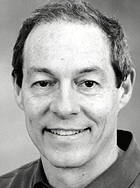A $7.7 million grant from the National Institute of Allergy and Infectious Diseases (NIAID) will establish a center for asthma research at the School of Medicine.
Directed by Michael J. Holtzman, M.D., the Selma and Herman Seldin Professor of Medicine, the center will investigate the causes of asthma to develop new treatments for the disease.
Named the Asthma and Allergic Diseases Cooperative Research Center, the center will conduct research specifically focused on how the body’s protective mechanism, the immune system, contributes to asthma.
“Normally, immunity is under tight control,” said Holtzman, who directs the Division of Pulmonary and Critical Care Medicine. “But if the immune response goes too far, it can cause inflammatory diseases like asthma.”
Previous research showed that viral infections of the lungs at an early age could trigger long-term asthma. The scientists will test children with respiratory infections, measuring their body’s response to the virus, and will follow their respiratory health for five years.

“We will look at the cell biology and the biochemistry of the children’s response to respiratory virus infection,” Holtzman said. “We know the more severe the infection is, the more likely a patient is to develop asthma later. We want to know at the cell level what determines the severity of the infection and how we can intervene to prevent asthma.”
Inflammation is the first response of the immune system, and current asthma treatments, including inhaled steroids, aid asthma sufferers by reducing inflammation. Unfortunately, steroids affect more than asthma symptoms.
“Steroids are flame-thrower drugs,” Holtzman said. “They inhibit many aspects of the immune response — not only the one that causes asthma, but also the ones that protect you from pathogens.”
Furthermore, steroid therapy is not a cure for asthma, Holtzman said. Research at the new center will seek asthma-specific anti-inflammatory treatments and therapies that modify the underlying causes of the disease instead of simply suppressing symptoms.
The researchers will look at signals that cells use to rev up antiviral defenses. They suspect disruptions in the signals sent between cells to shut down the immune response could be the root cause of an excessive and prolonged inflammatory response.
Comparing deficient cell responses with excessive responses in genetically engineered experimental mice will help the researchers uncover biomarkers — proteins that can serve as indicators of the immune response to viral infection. The biomarkers can reveal the level of specific immune responses in children with viral infections to help isolate the cause of asthma.
“We will be able to take what we find in the mice and immediately translate that into what we study in patients,” Holtzman said.
In addition to Holtzman, key investigators in the center include John P. Atkinson, M.D., the Samuel Grant Professor of Medicine and professor of molecular microbiology; Jonathan M. Green, M.D., associate professor of medicine and of pathology and immunology; and Kenneth M. Murphy, M.D., Ph.D., professor of pathology and immunology. The center is part of a cooperative group of 11 U.S. centers with NIAID funding set up to look for causes and treatments for asthma.